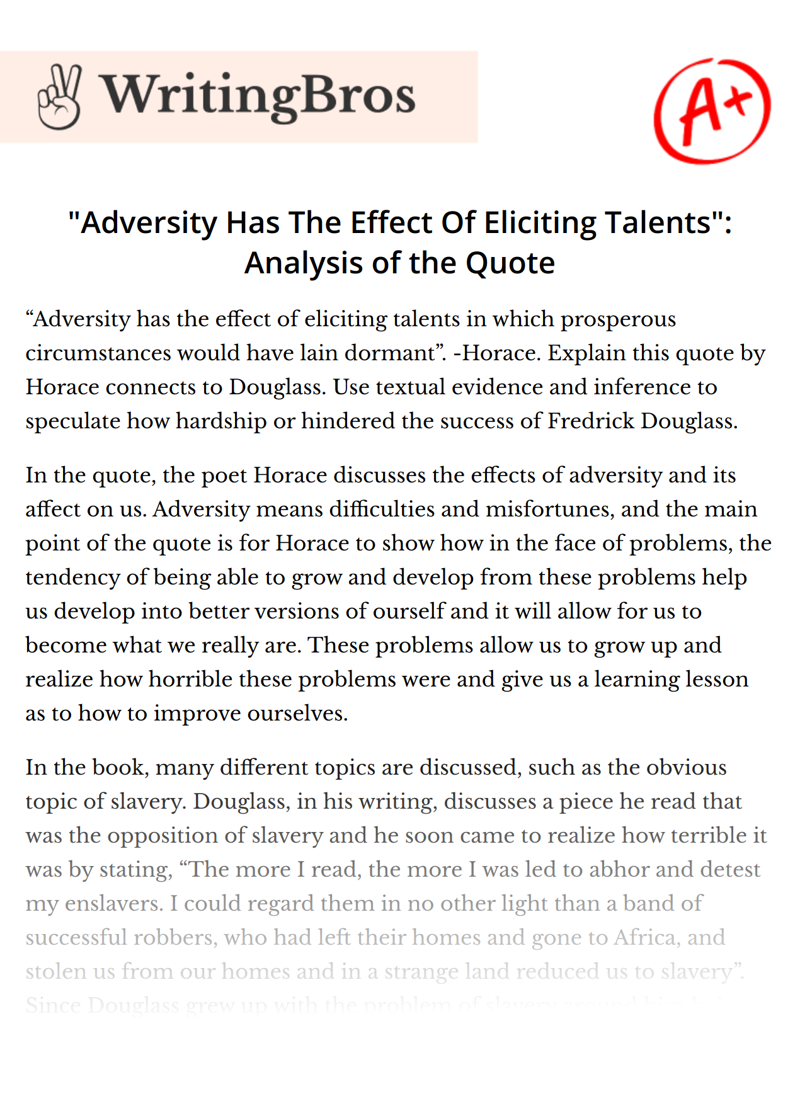"Adversity Has The Effect Of Eliciting Talents": Analysis of the Quote

“Adversity has the effect of eliciting talents in which prosperous circumstances would have lain dormant”. -Horace. Explain this quote by Horace connects to Douglass. Use textual evidence and inference to speculate how hardship or hindered the success of Fredrick Douglass.
In the quote, the poet Horace discusses the effects of adversity and its affect on us. Adversity means difficulties and misfortunes, and the main point of the quote is for Horace to show how in the face of problems, the tendency of being able to grow and develop from these problems help us develop into better versions of ourself and it will allow for us to become what we really are. These problems allow us to grow up and realize how horrible these problems were and give us a learning lesson as to how to improve ourselves.
In the book, many different topics are discussed, such as the obvious topic of slavery. Douglass, in his writing, discusses a piece he read that was the opposition of slavery and he soon came to realize how terrible it was by stating, “The more I read, the more I was led to abhor and detest my enslavers. I could regard them in no other light than a band of successful robbers, who had left their homes and gone to Africa, and stolen us from our homes and in a strange land reduced us to slavery”. Since Douglass grew up with the problem of slavery around him being one that he grew up in and became accustomed to, he wasn’t able to fully understand the problems of slavery and why it was such a horrible system. After reading these pieces and being able to understand what they were trying to state, he was able to grow from his understanding and realize how oppressive the system was and how horrible it treated the slaves, making him able to have his own opinion and understand, which would lead to the success of him being able to write the book.
In chapter 2, he discusses that when he was a slave as well, he heard many songs being sung by slaves that he “did not understand the deep meaning of those rude and apparently incoherent songs. I was myself within the circle; so that I neither saw nor heard as those without might see and hear”, and follows it up by stating, “Those songs still follow me, to deepen my hatred of slavery, and quicken my sympathies for my brethren in bonds. If any one wishes to be impressed with the soul-killing effects of slavery, let him go to Colonel Lloyd's plantation, and, on allowance-day, place himself in the deep pine woods, and there let him, in silence, analyze the sounds that shall pass through the chambers of his soul, - and if he is not thus impressed, it will only be because 'there is no flesh in his obdurate heart”. At first, him not being able to understand the slave songs was him being able to relate to the people who were outside of slavery who couldn’t understand the literal meaning of the song, but soon came to find out the actual horrors that the song represent and the meanings of them. Because of the fact that slaves used these songs to cope with slavery and the meanings of the songs were very deep and personal for the slaves, thus going back to the main point of Horace’s quote about how with growing, we can better understand and in the face of problems such as slavery, you can learn to cope by using mechanisms such as the singing of the slaves to face the negatives of the world.
Cite this Essay
To export a reference to this article please select a referencing style below

